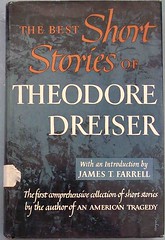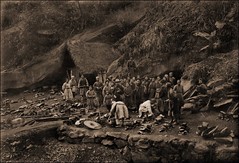AMSCO United States History 2015 Edition, Chapter 21 The Progressive Era, 1901-1917
| 9061372042 | professional associations | Groups of individuals who share a common profession and are often organized for common political purposes related to that profession. (p. 432) | 0 | |
| 9061372043 | Pragmatism | In the early 20th century this philosophy focused on using a practical approach to morals, ideals, and knowledge. They encouraged experimentation to find solutions that would produce a well-functioning democratic society. (p. 433) |  | 1 |
| 9061372045 | John Dewey | He was a philosopher who believed in "learning by doing" which formed the foundation of progressive education. He believed that the teachers' goal should be "education for life and that the workbench is just as important as the blackboard." |  | 2 |
| 9061372046 | Frederick W. Taylor | An engineer who sought to eliminate wasted motion. Famous for scientific-management, especially time-management studies. (p. 433) |  | 3 |
| 9061372047 | scientific management | A management theory using efficiency experts to examine each work operation, then find ways to minimize the time needed to complete the work. (p. 433) | 4 | |
| 9061372049 | Standard Oil Company | Company of oil refineries that eventually became a virtual monopoly for all refineries through a trust, which consolidated power into 9 trustees in the group that allowed one very large company without one actually owning another. (FIRST EXAMPLE OF A MONOPOLY) |  | 5 |
| 9061372050 | Lincoln Steffans | He wrote "The Shame of the Cities" (1904) which described in detail the corruption that characterized big-city politics. (p. 434) |  | 6 |
| 9061372051 | Ida Tarbell | A leading muckraker and magazine editor, she exposed the corruption of the oil industry with her 1902 series "The History of the Standard Oil Company". (p. 434) |  | 7 |
| 9061372052 | Jacob Riis | In 1890 he wrote "How The Other Half Lives" which showed the terrible conditions of the tenement houses of the big cities where immigrants lived during the late 1800s. (p. 434) |  | 8 |
| 9061372053 | Theodore Dreiser | An American author who wrote "The Financier" and "The Titan", novels which portrayed the avarice and ruthlessness of an industrialist. (p. 434) |  | 9 |
| 9061372054 | Australian ballot | A government printed ballot of uniform size and shape to be cast in secret that was adopted by many states around 1890. (p. 435) | 10 | |
| 9061372055 | direct primary | A primary where voters directly select the candidates who will run for office | 11 | |
| 9061372056 | Robert La Follett | In 1903 this Progressive Wisconsin Governor introduced a new system which allowed the voters to directly choose party candidates, rather than being selected directly by party bosses. (p. 435) |  | 12 |
| 9061372057 | Seventeenth Amendment | 1913 constitutional amendment allowing American voters to directly elect US senators |  | 13 |
| 9061372058 | direct election of senators | In 1899 Nevada was the first state to elect U.S. senators directly. Previously state legislatures had chosen them. (p. 435). Made national by the 17th Amendment | 14 | |
| 9061372059 | initiative, referendum, and recall | Initiative allowed reformers to circumvent state legislatures by submitting new legislature to the voters in general direct election. Referendum is the method by which actions of the legislature could be returned to the electorate for approval. Recall allows for the removal of a politician from office. |  | 15 |
| 9061372060 | municipal reform | City bosses and their corrupt alliance with local businesses such as trolley lines and utility companies were targeted for reform by Progressives. (p. 436) |  | 16 |
| 9061372063 | commission plan | A city's government would be divided into several departments, which would each be placed under the control of an expert commissioner. (p. 436) | 17 | |
| 9061372064 | city manager plan | Legislation designed to break up political machines and replace traditional political management of cities with trained professional urban planners and managers. (p. 436) | 18 | |
| 9061372066 | Wisconsin Idea | A series of Progressive measures that included a direct primary law, tax reform, and state regulatory commissions. (p. 436) | 19 | |
| 9061372068 | state Prohibition laws | By 1915 two-thirds of the states had passed these laws which prohibited the sale of alcohol. (p 437) |  | 20 |
| 9061372069 | National Child Labor Committee | They proposed child labor laws which were adopted by many of the states. (p. 437) |  | 21 |
| 9061372070 | compulsory school attendance | Many states passed laws such as this, which made it mandatory for children to go to public schools. |  | 22 |
| 9061372071 | Florence Kelley | A reformer who prompted state laws which protected women from long working hours. (p. 437) |  | 23 |
| 9061372074 | Muller v. Oregon | A 1908 Supreme Court ruling that women needed protection against working long hours. (p. 437) |  | 24 |
| 9061372075 | Triangle Shirtwaist fire | In 1911 a high-rise garment factory burned in New York, killing 146 people, mostly immigrant women. Led to improved safety and working conditions in factories. |  | 25 |
| 9061372076 | Square Deal | Economic policy by President Theodore Roosevelt that favored fair relationships between companies and workers. (p. 438) | 26 | |
| 9061372077 | anthracite coal miners' strike 1902 | Pennsylvania coal miners went on strike for and increase in pay and shorter working day. When the mine owners refused to negotiate, Roosevelt threatened to seize control of mines. A compromise was finally agreed upon. (p. 438) |  | 27 |
| 9061372078 | trust-busting | President Roosevelt broke up the railroads and Standard Oil by using the Sherman Antitrust Act. (p. 438) |  | 28 |
| 9061372079 | Elkins Act | This 1903 act allowed the Interstate Commerce Commission (ICC) to stop railroads from granting rebates to favored customers. (p. 438) |  | 29 |
| 9061372080 | Hepburn Act | This 1906 act tightened existing railroad regulation. Empowered the Interstate Commerce Commission to set maximum railroad rates and to examine railroad's financial records. (p. 438) |  | 30 |
| 9061372081 | Uptown Sinclair | He wrote "The Jungle" which described the Chicago stockyards and meatpacking industry. (p. 438) |  | 31 |
| 9061372082 | Pure Food and Drug Act | This 1906 act forbade the manufacture or sale of mislabeled or adulterated food or drugs, it gave the government broad powers to ensure the safety and efficacy of drugs in order to abolish the "patent" drug trade. (p. 438) | 32 | |
| 9061372083 | Meat Inspection Act | This 1906 act provided federal inspectors to visit meatpacking plants to insure that they met sanitation standards. (p. 439) | 33 | |
| 9061372084 | Newlands Reclamation Act | A 1902 act that provide public land for irrigation project in western states. (p. 439) | 34 | |
| 9061372087 | Socialist Party of American | This third party was dedicated to the welfare of the working class. Their platform called for more radical reforms such as public ownership of the railroads, utilities, and even some major industries such as oil and steel. (p. 440) |  | 35 |
| 9061372088 | Eugene V. Debs | One of the founders of the Socialist party and the party's presidential candidate from 1990 to 1920. (p. 440) |  | 36 |
| 9061372089 | Bull Moose Party | Nickname for the new Progressive Party, which was formed to nominate Theodore Roosevelt in the 1912 presidential election. (p. 441) |  | 37 |
| 9061372090 | New Nationalism New Freedom | Roosevelt's political philosophies during the 1912 election. He argued was human welfare versus property rights | 38 | |
| 9061372092 | Sixteenth Amendment | Ratified in 1913 this constitutional amendment explicitly permitted Congress to levy an income tax. (p. 439) | 39 | |
| 9061372093 | federal income tax | A payroll deduction collected by employers by law and sent to the federal government to pay for governmental programs. | 40 | |
| 9061372096 | Underwood Tariff 1913 | a graduated income tax under the 16th amendment that applied solely to corporations and the tiny fraction of Americans who earned more than $4000 a year | 41 | |
| 9061372097 | Federal Reserve Act | In 1914 this act created a central banking system, consisting of twelve regional banks governed by the Federal Reserve Board. It was an attempt to provide the United States with a sound yet flexible currency. It still plays a major role in the American economy today. (p. 442) | 42 | |
| 9061372099 | Clayton Antitrust Act | Antitrust legislation passed in 1914 constructed to remedy deficiencies of the Sherman Antitrust Act for breaking up monopolies. It exempted unions for being prosecuted as trusts. (p. 442) |  | 43 |
| 9061372100 | Federal Trade Commision | A government agency established in 1914 to prevent unfair business practices and help maintain a competitive economy. (p. 442) |  | 44 |
| 9061372104 | Booker T. Washington | African American progressive who argued that African Americans should concentrate on learning industrial skills for better wages. (p. 443) |  | 45 |
| 9061372105 | W. E. B. Du Bois | He argued that African American should demand equal rights and only that would help them achieve economic advances. (p. 444) |  | 46 |
| 9061372106 | National Association for the Advancement of Colored People | This organizations mission was to abolish all forms and abolish all segregation and increase educational opportunities for African Americans. (p. 444) | 47 | |
| 9061372107 | National Urban League | Formed in 1911 this organization helped people migrating from the south to northern cities. (p. 444) | 48 | |
| 9061372108 | Carrie Chapman Catt | A suffragette who was president of the National Women's Suffrage Association, and founder of the International Woman Suffrage Alliance. Instrumental in obtaining passage of the 19th Amendment in 1920. (p. 445) |  | 49 |
| 9061372109 | National American Woman Suffrage Association | A group formed by leading suffragist in the late 1800s to organize the women's suffrage movement. (p. 445) | 50 | |
| 9061372110 | Alice Paul | A suffragette who focused on obtaining an amendment to the Constitution for women's suffrage. (p. 445) |  | 51 |
| 9061372111 | National Woman's party | radical group founded by Alice Paul which fought for woman's suffrage | 52 | |
| 9061372112 | Nineteenth Amendment | In 1920 this amendment passed which gave women the right to vote. (p. 445) |  | 53 |
| 9061372113 | League of Woman Voters | Organized by Carrie Chapman Catt. A civic organization dedicated to keeping voters informed about candidates and issues. (p. 445) | 54 | |
| 9061372114 | Margaret Sanger | She founded an organization the became Panned Parenthood. They advocated for birth-control education. (p. 445) |  | 55 |

